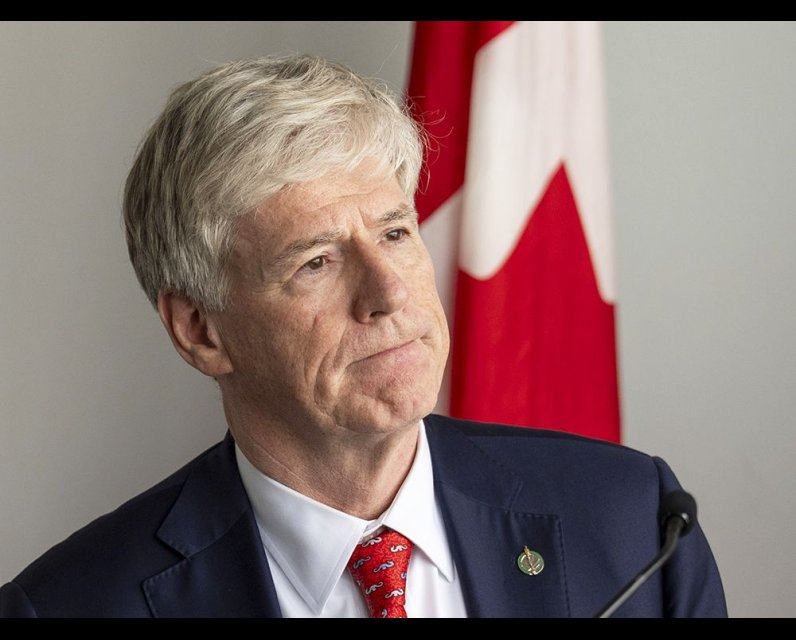Q&A with Canada's energy minister: 'I think there's a risk aversion in government'

OTTAWA — When Mark Carney was first campaigning for the job of Liberal leader and, ultimately, prime minister, he cast himself as a political outsider.
After winning the job, Carney recruited another political outsider to join his ranks: Energy Minister Tim Hodgson.
Hodgson and Carney go way back. The prime minister tapped Hodgson to serve as his special advisor when he was appointed governor of the Bank of Canada. A former investment banker, Hodgson joined the Liberals as a political newbie and was soon handed the file of natural resources. It comes at a time when the prime minister has promised to build big in Canada, with a special eye towards developing its resources, from clean to conventional energy.
Energy and Natural Resources Minister Tim Hodgson sat down with National Post to discuss his file.
This is a portion of a longer interview and has been edited for length and clarity.
The problem with governmentNational Post: What’s been your diagnosis of why government works the way it does? I think there’s an expectation, or at least a signal the government has sent, and you’re no small part of that, that you want it to work faster, maybe a bit more like the private sector. What has, in your mind, since you’ve been six months working inside of government, what has been the biggest barrier (that) kind of stands in the way of why we haven’t been able to do that?
Hodgson: I think there’s a risk aversion in government that causes government to want to move slowly, to consider all the possible risks in every scenario. And while I think there is merit in doing that, sometimes, certainly you find in the private sector, that you need to take risks to get rewards. And I think that balance in government probably got, as the prime minister would say, we were really good at asking, if not, how. I think what we’re trying to do is shift it from — we are in, as the prime minister calls it, a hinge moment. You’re in a moment of rupture in the global trading order, and that level of risk aversion doesn’t serve us well.
National Post: Have you found moments where you’ve encountered that risk aversion within government, say in the public service, or in your department, where you’ve had to kind of push back a little bit, or challenge the conventional thinking, perhaps?
Hodgson: Look, I think the civil service is very good at pointing out, “these are the risks of this, this.” And it’s like, “yeah, but here are the rewards.” In the private sector, you have to take risks to get the rewards. Oftentimes the risks are … the risks are very politically obvious. The rewards are diverse to all Canadians. So we have to keep recognizing that, yes, there are political risks in taking decisions, but those rewards go to all Canadians, and that’s ultimately our job is to serve all Canadians. So, don’t over-index on risk. Consider the risks carefully, but also make sure you’re focusing on what are the rewards. What are the rewards for all Canadians? And sometimes we have to take those political risks.
What about Alberta’s pipeline pitch?National Post: What do you make of the arguments that you’ve heard from the premiers and perhaps others in the oil patch as, ‘well scrap it, and proponents will come?’ Scrap it being Bill (C-69), Bill C-48 —scrap it, and the proponents will come for this pipeline?
Hodgson: I’ve said this publicly many times. Can you imagine an OECD country that rips up its environmental legislation and does not replace it with something new? I can’t. So let’s talk about how long it takes to get that new legislation passed, and then let’s talk about how long it’s going to take, as every stakeholder wants to litigate it, every clause with the Supreme Court. And let’s talk about the dialogue that’s going to need to go on with Indigenous Peoples … I think that is a formula for delay. I think that is a formula for wasting time when we don’t have time. Our bill, the Building Canada Act, provides a mechanism to get through all this. We think it’s a much more thoughtful way of doing this.
National Post: Having said that, with Bill C-5 now law, do you still see a need, specifically on the Impact Assessment Act, which Bill C-5, the law touches? Do you still see a need to revisit that legislation at some point, if not now, at some point in this mandate?
Hodgson: We are always looking at ways to make things better. I’ll give you (an) … example, the one project, one review, which we’re working on with each of the provinces right now, which will substantially reduce the regulatory burdens. And I would point out, it seems to be lost on a lot of folks: We have one project, one review with British Columbia right now. They approved the Ksi Lisims project at four o’clock on a Monday. The federal government approved it at 4:30.
National Post: But specifically on the Impact Assessment Act, do you still see a need?
Hodgson: That’s (Environment) Minister (Julie) Dabrusin’s area. I think the prime minister and Minister Dabrusin have been working very hard on their climate competitive strategy. They’ve said that will come out as part of the budget.”
Alberta separation and energyNational Post: How much does the separation debate playing out in Alberta factor into government decision-making when it comes to energy projects?
Hodsgon: (Pause) I’m hesitating because I think keeping this country together is the most important thing we can do. It’s the greatest country in the world. We are stronger together than we are apart. As somebody who grew up in the West and my mother’s family is all from Alberta, wanting Albertans to feel like they have a strong place in Canada is really important to me. I believe that if we can show all Canadians that we can develop our energy in a responsible way, in an environmentally responsible way, with the support of First Nations, we can do that. We can show Albertans there is a strong place for them in Canada.
National Post: But does the separation debate factor into decision-making?
Hodsgon: We listen to all Canadians. I listen to Canadians in Prince Edward Island. I listen to Canadians in British Columbia. I listen to Canadians in Alberta. That’s why I went there early on. It’s why I stopped in Saskatchewan first. You know, as somebody from the West, I remember saying, ‘I’m not flying over Saskatchewan.’ So, do we listen to Canadians? Yeah, we listen to Canadians always, and we fully understand the debate that’s going on.
National Post
Our website is the place for the latest breaking news, exclusive scoops, longreads and provocative commentary. Please bookmark nationalpost.com and sign up for our daily newsletter, Posted, here.


Comments
Be the first to comment